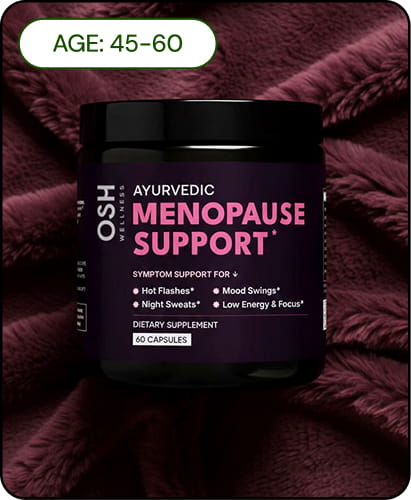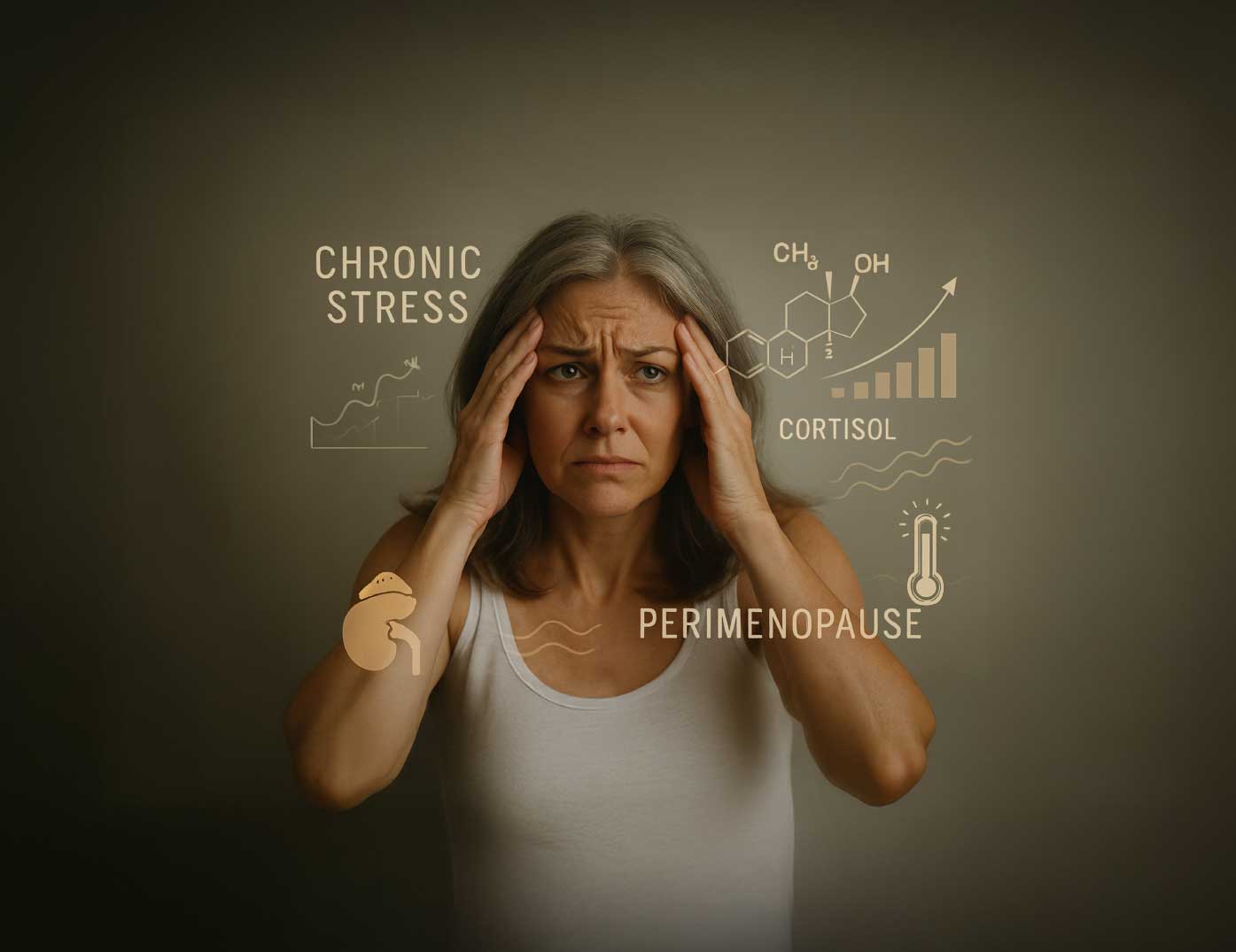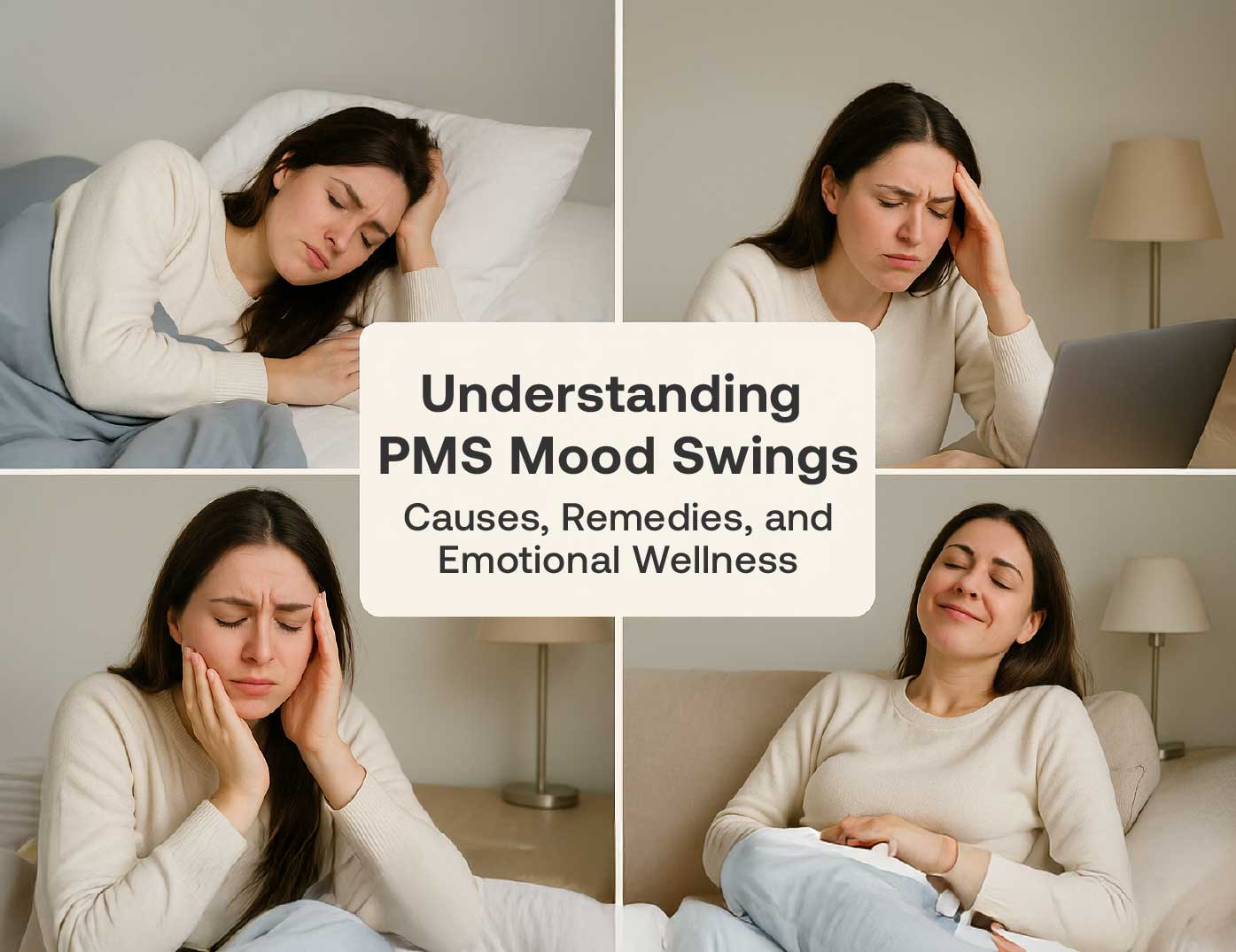Table of contents
Chronic stress and cortisol levels have profound effects on women's health, especially during the perimenopausal phase a time defined by hormonal fluctuations. During this transitional stage, many women endure debilitating symptoms such as hot flashes, mood swings, and fatigue. Elevated cortisol levels, often a result of prolonged stress, can worsen these symptoms and further distort hormonal balance. This article explores the complex relationship between stress and perimenopausal symptoms and offers actionable strategies for managing this critical period.
Introduction

Perimenopause and chronic stress are intricately linked through the body's hormonal systems. The perimenopausal phase is marked by unpredictable fluctuations in reproductive hormones, primarily estrogen and progesterone, leading to both physical and emotional disruptions. Cortisol, the body's primary stress hormone, significantly influences this hormonal interplay.
According to the Seattle Midlife Women's Health Study, cortisol levels tend to increase with age and are even more pronounced during perimenopause due to heightened stress and hormonal unpredictability [1]. Common symptoms such as hot flashes, irritability, and profound fatigue are often magnified by elevated cortisol. This creates a vicious cycle where stress amplifies symptoms, which in turn raise cortisol levels and further aggravate hormonal imbalance [2].
Understanding the impact of stress on perimenopausal women is essential. Mitigating high cortisol levels within the larger hormonal picture not only reduces symptom severity but also improves overall well-being during this life transition [3].
Understanding Perimenopause and Its Symptoms

Perimenopause refers to the transitional years leading up to menopause, typically lasting between 2 and 10 years. This phase is marked by erratic hormone production, especially drops in estrogen and progesterone, which affects physical health and emotional stability [4].
Commonly reported symptoms include:
Hot flashes and night sweats
Sleep disruptions
Cognitive challenges or memory lapses
Irregular menstrual cycles in duration, intensity, and frequency [6]
Psychologically, around 40% of women experience mood changes such as anxiety and depression during this period [5]. Reduced estrogen levels also increase the risk of developing osteoporosis and cardiovascular issues in later life [7].
Despite these substantial changes, many women are unaware of what perimenopause entails. This knowledge gap can make it harder for them to seek support or treatment at a stage where intervention can make a significant difference.
The Connection Between Chronic Stress and Hormonal Imbalance

Chronic stress can disrupt hormonal equilibrium, intensifying the effects of fluctuating estrogen and progesterone levels during perimenopause. Elevated cortisol plays a disruptive role by exacerbating hormonal imbalances, contributing to mood disorders, insomnia, and metabolic instability [8].
Here’s how chronic stress and hormonal imbalance interact:
As estrogen declines, its capacity to regulate the HPA (hypothalamic-pituitary-adrenal) axis weakens, limiting stress resilience [9].
Increased cortisol further inhibits progesterone, which typically supports calmness and mood regulation [11].
This hormonal shift intensifies symptoms such as irritability, hot flashes, and disrupted sleep [10][10] .
Left unmanaged, this hormonal and emotional turbulence raises long-term health risks, such as cardiovascular disease and bone density loss. Therefore, managing stress is paramount in maintaining hormonal stability during perimenopause [12] .
Effects of Elevated Cortisol on Perimenopausal Symptoms

High cortisol levels during perimenopause elevate the intensity of many common symptoms. The shifting balance of estrogen and progesterone already increases the likelihood of discomfort. When paired with elevated cortisol, the body’s response becomes amplified [1].
Specific effects include:
Sleep disturbances and insomnia from high nighttime cortisol [14]
Mood instability, cognitive fog, and increased emotional reactivity [3]
Fatigue, gastrointestinal distress such as bloating and acid reflux [3]
Increased weight gain, particularly around the abdomen, known as “cortisol belly” [13]
Data from the Seattle Midlife Women’s Health Study underscore this connection, reinforcing that stress reduction strategies could significantly moderate the severity of perimenopausal symptoms [15].
Stress Management Techniques for Perimenopausal Women

Addressing stress during this phase is critical. A multi-pronged approach involving therapeutic techniques, lifestyle adjustments, and psychological support can substantially improve well-being.
Key strategies include:
Mindfulness practices like deep breathing and progressive muscle relaxation to reduce anxiety and cortisol levels [16]
Cognitive Behavioral Therapy (CBT) to address negative thought loops and improve mood regulation [17]
Regular physical activity, including cardio, strength training, and yoga for hormonal balance [18]
Nutrition and sleep hygiene to support recovery and manage symptoms [19]
These interventions, when practiced consistently, empower women to manage their health more proactively and improve their quality of life.
Medical and Natural Interventions for Stress Relief

Managing cortisol through a combination of medical and natural interventions can provide significant relief during perimenopause. While medications such as antidepressants and sleep aids may be prescribed to manage anxiety or insomnia, they should be used cautiously and under medical supervision due to side effect risks [21].
Supportive supplements, such as magnesium and B-complex vitamins, have been shown to help regulate cortisol metabolism and should be considered with medical guidance [22].
Natural solutions include:
Meditation and mindfulness-based emotional resilience [23]
Anti-inflammatory, whole-food, stress-reducing diets [24]
Adaptogenic herbs like ashwagandha[25]
- Osh Wellness Hormone & Mood Support provides comprehensive cortisol support during hormonal transitions
A holistic plan incorporating these elements offers the best potential to reverse the chronic stress response during perimenopause.
Relevant Products
Osh Wellness Hormone & Mood Support is specifically formulated to aid women undergoing perimenopause. By promoting hormonal balance and discouraging cortisol spikes, this supplement may serve as a helpful addition to overall wellness strategies.
Conclusions

Perimenopause is a time of significant physical and emotional change. Recognizing the influence of chronic stress and elevated cortisol levels helps women better understand their symptoms and empowers them to take action. Through lifestyle changes, therapeutic interventions, and supplementation, women can ease their perimenopausal journey, maintain hormonal harmony, and improve long-term health outcomes.
FAQs
What is the relationship between stress and perimenopause?
Stress raises cortisol levels, which can worsen perimenopausal symptoms and disrupt hormonal balance.
How can cortisol levels affect menopause symptoms?
Elevated cortisol can intensify symptoms like sleeplessness, anxiety, mood changes, and fatigue.
What are effective ways to manage stress during this period?
Strategies include mindfulness, therapy, regular exercise, proper nutrition, and supplementation.
What role do lifestyle changes play in hormonal balance?
Healthy habits support the endocrine system, lower cortisol, and ease transitions during perimenopause.
How can women identify if they are experiencing perimenopause?
Irregular periods, hot flashes, mood shifts, and sleep problems commonly signal perimenopause.
Sources
1: Adach, W., Ryczkowska, K., Janikowski, K., et al. (2022). Menopause and women's cardiovascular health – is it really an obvious relationship? Archives of Medical Science, 19(2). https://doi.org/10.5114/aoms/157308
2: Benenden Hospital - Understanding High Cortisol Levels in Females
3: Proov Test - Understanding Cortisol Levels During Perimenopause
4: Contemporary OB/GYN - Study: Perimenopause Symptoms Common in Women as Young as 30
5: ACOG - Mood Changes During Perimenopause
6: PMC - Understanding the Symptoms of Menopause
7: Yale Medicine - Menopause is Finally Having Its Moment
8: Proov Test - Cortisol & Hormones
9: Rockville OBGYN - Stress & Hormones
10: Kelsey-Seybold - Hormonal Imbalance & Stress
11: Inner Balance - Cortisol & Perimenopause
12: Dutch Test - Menopause & Stress
13: Positive Pause - Cortisol and Menopause
14: PubMed - Cortisol and Sleep Disruption in Menopause
15: WSOC TV - Cortisol, Weight, and Women
16: Winona - Tips for Managing Stress
17: Therapeutic Partners - Navigating Perimenopause
18: Jackson Health - Six Stress Hacks for Perimenopause
19: Dr. Sarah Allen - Menopause Counseling
21: Johns Hopkins Medicine - Stress Busters
22: Karen Threlkel - Lower Cortisol in Women
23: Mind - Stress Treatment Approaches
24: American Heart Association - Women and Stress Management
25: Henry Ford Health - Lowering Cortisol Naturally








